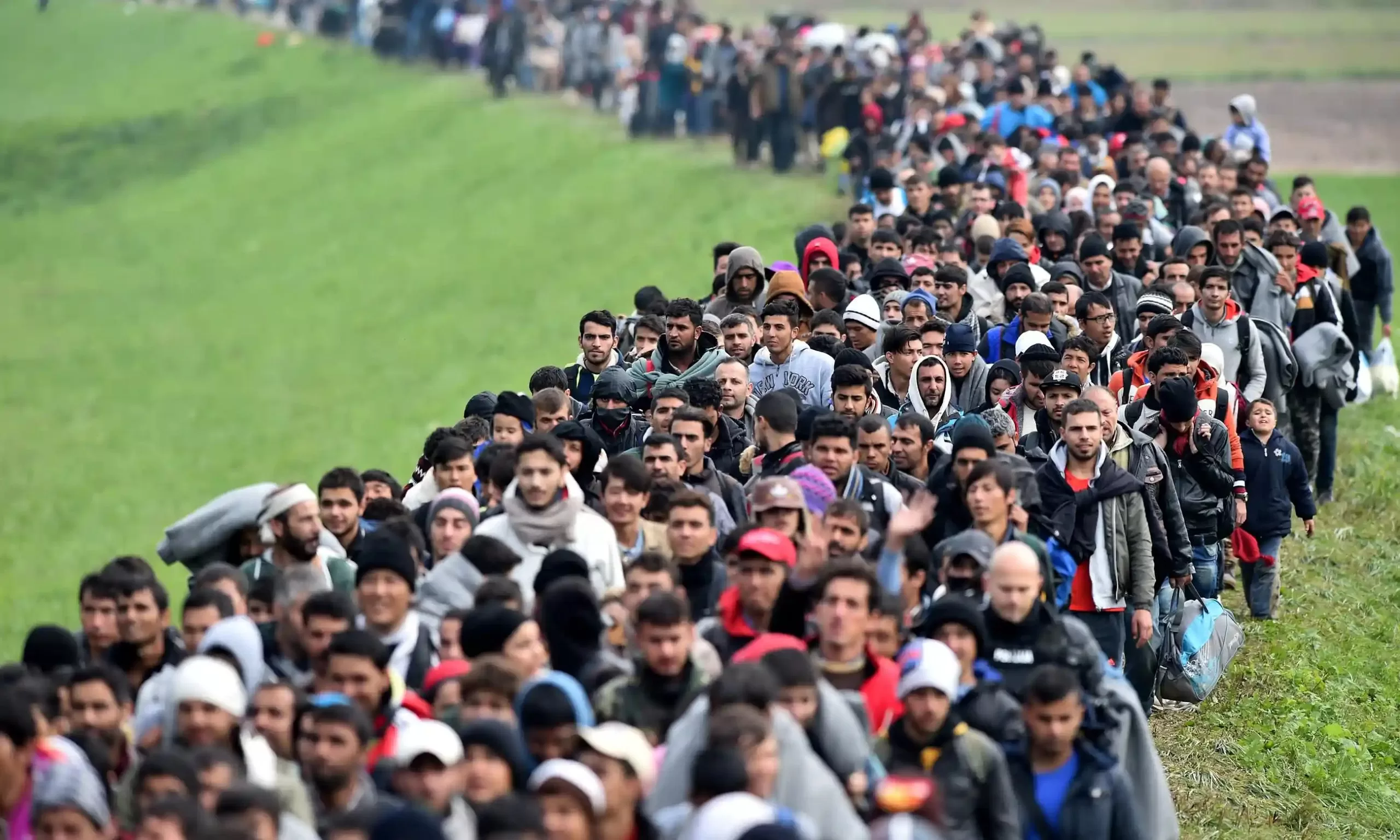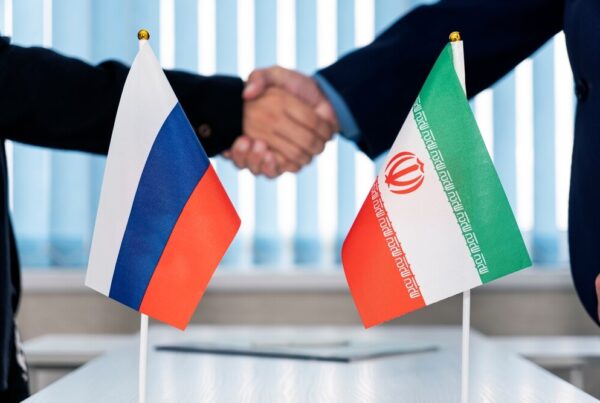In The Hour of Decision, published in 1934, the German historical philosopher Oswald Spengler prophesied:
The white ruling nations have abdicated from their former rank. They negotiate today where yesterday they would have commanded, and tomorrow they will have to flatter if they are even to negotiate. They have lost the feeling of the self-evidence of their power and are not even aware that they have lost it.
On June 8, in a move that has left patriots shaking their heads in disbelief, Brussels functionaries have hammered out a deal that spreads the burden of housing immigrants and refugees across the European Union – an issue that has sparked fiery division in the bloc for the last decade.
The number of asylum applications in the EU has recently increased significantly following a decrease during the Corona crisis. Last year, according to official figures, 881,200 first-time applications were made in the 27 member states. Compared to the previous year, this represented an increase of 64 percent. This resurgence of asylum applications post-Corona further exemplifies the unrelenting pressure the EU faces from unchecked immigration. The staggering 64 percent rise underscores the urgent need for firm policies that uphold national sovereignty and protect the cultural integrity of Europe.
Once the majestic seat of the mighty Roman Empire, revered for its monumental feats in law, architecture, and culture, Italy today finds itself far from its ancient glory. Now, instead of triumphantly dictating the course of history, it bears the weight of a relentless influx of immigrants. The UN Refugee Agency reports that this cradle of civilization, this very birthplace of the Renaissance, has already registered more than 50,000 immigrants in the current year alone. In stark contrast to its resplendent past, the Italy of today seems to be in a state of defeat, worn down by the constant barrage of humanity flooding its once proud shores. The nation’s resilience is severely tested as it grapples with the monumental task of this growing immigration crisis, which stands in stark contrast to the majesty of its legendary past.
After a grueling twelve-hour negotiation on Thursday, European Union ministers finally strong-armed Italy and Greece into a deal outlining the shared responsibility for handling immigrants and refugees. This agreement, which has been a specter haunting the bloc for nearly a decade, was sealed by the home affairs ministers of the EU with the optimistic hope of putting to rest years of bitter division. This discord has plagued the EU since 2015, a year that saw an astonishing influx of over a million individuals – mostly from the volatile Middle East – crashing against the EU’s Mediterranean borders. It is clear as day that the top dogs in the EU hierarchy are more devoted to their ideologically driven open border agenda than they are to the concerns of everyday Europeans, who are left to shoulder the impacts of these policies.
Germany’s Nancy Faeser, the EU’s top immigration official, seemingly reveling in the erosion of national autonomy, hailed this agreement as a so-called “historic” moment. Yet, let us be clear – this is not a victory of diplomacy but rather a capitulation to the unchecked immigration crisis. To further celebrate this fiasco, Faeser had the audacity to declare this a “win-win” situation for all member states. This begs the question: who is really winning here? Is it the nations witnessing their identities and social fabrics change irrevocably, or is it simply the faceless officials in the EU parliament, further consolidating their control over our borders and immigration policies? As this situation unfolds, it is clear we are witnessing a power play masquerading as benevolent policy-making.
As Ylva Johansson, the European Commissioner for Home Affairs, enthusiastically declared, “We are so much stronger when we work together,” one cannot help but question the true implications of this statement. Is this unity she speaks of, or is it a thinly veiled attempt to coerce nations into relinquishing control over their own borders? For many countries, rather than symbolizing collective strength, this appears to be a blatant capitulation to a globalist agenda. It represents not empowerment but submission to a bureaucratic stronghold that undermines national sovereignty and compromises the very integrity of the European nations’ cultural and social landscapes. This is a far cry from strength – it is the erosion of national identity masked as solidarity.
While the southern frontier countries of the EU, namely Italy and Greece, continue to cry out for assistance to deal with the inundation of immigrants arriving on their shores, the Eastern European nations of Poland and Hungary are setting a commendable example. These stalwart nations have made a courageous stand, unequivocally refusing to accept any influx from the predominantly Muslim regions of the Middle East and North Africa. Their firm stance not only prioritizes the safety and cohesion of their own societies but also sends a potent message of defiance against the unchecked mass immigration policies that threaten Europe’s cultural heritage and national security.
Under the new deal, each country would be allocated a certain number of individuals but would not necessarily have to house them. Countries resistant to accepting undocumented immigrants now have a potential escape route: they can essentially purchase their absolution by contributing approximately 20,000 euros per individual, or alternatively provide equipment or staff to those nations open to accommodating the immigrants. This new deal, where countries can buy their way out of accepting immigrants, is nothing but a cynical manipulation. It does not solve the core problem but instead perpetuates a system that is fundamentally flawed.
While the globalist bureaucrats and their lackeys may be celebrating this as a breakthrough, the cold hard truth is that this agreement merely perpetuates a system that is already broken. It does nothing more than paper over the cracks of an immigration catastrophe that has seen our borders besieged and our societies strained. This “solution” is like using a sticking plaster on a gushing artery, doing nothing to address the root causes of unchecked immigration – weak border controls, overzealous human rights laws, and generous welfare systems. Until we get serious about tackling these real issues, we are sleepwalking into a future where our national identities and security are under constant threat.
Were I an indigent soul hailing from the sprawling landscapes of Africa, I too would feel an insuppressible draw to traverse the perilous waters towards Europe, given that I am, in essence, summoned by enticing promises. From my humble abode, a mere hut amidst the vast expanse of the savannah, I am beckoned by the distant allure of safety, shelter, and sustenance provided seemingly without demand for exchange. If the option is laid bare before me to endure existence in the stark scarcity of my homeland, or to venture towards a land where the illusion of free dwelling and sustenance prevails, the human instinct for survival would steer me towards the latter. The call is not simply to subsist, but to live. Thus, why would I persist in the arid lands of Africa, trapped in a perpetual dance with hunger and hardship, when the tempting mirage of Europe looms, presenting a promise of alleviation from this cycle of scarcity?
Spengler carried the following belief:
The white world is governed primarily by idiots – if it is governed at all, which one is entitled to doubt.






There are numerous advantages to your situation than say, our situation in Canada and the immigration structure in the US. In Canada, immigration is rationalized based on the quality i.e. education, qualifications etc. of immigrants: we only take the creme of the crop, or that’s what we are told. Ultimately, what matters is whether Canadians believe this. As all questions are reduced to economics, it is much harder to make the anti-immigration case in this scenario to a receptive public, when the immigrants themselves are educated and of a supposedly net benefit. The quality of arrivals into Europe is much lower i.e. they are not accretive to the economy and given the idiosyncrasies and depth of ethno-historic identities of European nations, assimilation is near impossible so the dialectic can proceed explicitly. In Canada as in the US, this is not so as immigrants become doctors. Arguing based on national cohesion, ethno-historical factors etc. does not ring with North Americans. I wish it did, but it doesn’t, so the process of national destruction proceeds silently, in a quasi-subterranean fashion without interruption or any signs of one.
Your average Frenchman etc. does not want mass immigration but the political question of immigration itself has become nationally depoliticized i.e., located in the EU structure. Ultimately, the EU’s toolkit is economic, though for poorer nations it is difficult to defy that great behemoth i.e., Greece, particularly given their fiscal histories and obligations. Until we can manifest a legitimate populist movement that can incorporate the legitimate contempt and sense of betrayal by our elites, they will continue with impunity.
^Robert
It’s true that non-immigration may be more difficult to sell to North Americans in the established political system, but I am sure that the white majorities still secretly want it. That secret inner desire is what still makes us relevant..